Howard Andrew Jones's Blog, page 80
September 5, 2012
More Soon
Behind the scenes here at Casa Jones I’ve been working on promotional stuff for The Bones of the Old Ones, helping steer a map for the next book into shape (yes, Bones will have a map!) and drafting a very long Worldcon report for Black Gate.
Thus I will keep today’s post very short. I need to get to some actual prose writing. More soon, I promise. Maybe I can even tease you a bit with the map when it’s finalized…
September 3, 2012
On Saladin Ahmed, and How He Rocks
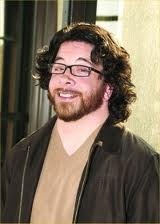 Two years ago I was talking with the brilliant and charming Mary Robinette Kowal at DragonCon about my upcoming novel (The Desert of Souls, not The Bones of the Old Ones, which wasn’t even written yet) and she happened to mention that another fellow had been writing stories about a duo of Arabian fantasy characters fighting things man was not meant to know. I feigned polite interest, but I knew a sudden chill. That was my thing! Who was this other guy?
Two years ago I was talking with the brilliant and charming Mary Robinette Kowal at DragonCon about my upcoming novel (The Desert of Souls, not The Bones of the Old Ones, which wasn’t even written yet) and she happened to mention that another fellow had been writing stories about a duo of Arabian fantasy characters fighting things man was not meant to know. I feigned polite interest, but I knew a sudden chill. That was my thing! Who was this other guy?
Well, it turns out his name is Saladin Ahmed, and at this point you’ve surely heard of him. He’s talented, gracious and damned funny, but I didn’t know any of that two years back. All I knew was a fear that someone was doing my shtick. What I didn’t know is that he’d heard about Howard Andrew Jones in much the same way, with a similar reaction (when we traded stories at ConFusion he mimed the moment of learning about me by shaking his fist at the heavens and cursing my name). We had a good laugh.
We’re not doing exactly the same thing, what with me writing in a fantastic 8th century and him writing in a secondary world, but we do seem to be among the few modern writers engaged the creation of “Arabian Fantasy.” Rather than thinking of him as a competitor, as was my first terrified thought, I have come to think of him as my sword-brother. Not just because we value a lot of the same features in our fiction — and I mean beyond the obvious — and not just because he’s a gifted writer, but because he’s the kind of friend who’s got your back.
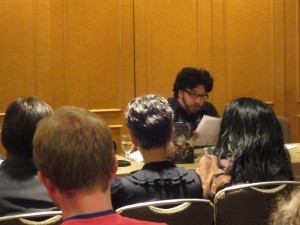
Saladin in the midst of a stirring narrative.
As an interested and slightly worried acquaintance I had heard him read from Throne of the Crescent Moon at the World Fantasy Convention in 2010. As his friend I got to hear him read his new short story, “Without Faith, Without Law, Without Joy” at Worldcon last Saturday. It was the first time I’d heard the work, and I was greatly impressed not just by his delivery, but by the story itself. He was aided by historical re-enactor Tom Nanson, reading from Spenser’s Faerie Queen with great authority and proper diction (not to mention a fantastic costume).
The story addressed the de-humanized portrayal of the Muslim antagonists in Spenser’s great poem with a moving and haunting view from the other side of the tale. In the poem, the brave English knight faces down and kills three heathen knights who might as well have been cardboard cutouts. Saladin gave them names and histories and more, and, as I told him after the reading, just at the moment when you are afraid you know too well how the tale will end he delivers a powerful and uplifting conclusion. I dare say no more without spoiling it for future readers, but I was a little choked up with the final words.
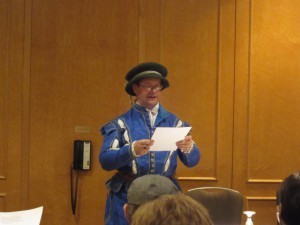
Tom Nanson at Saladin’s reading.
Judging by the enthusiastic reaction from the standing-room-only crowd, I wasn’t alone.
There are scads of western-based fantasy series on bookstore shelves, but you can count all the modern Arabian fantasists on one hand. I am heartily glad one of them is Saladin. And I am proud to call him friend.
August 31, 2012
Worldcon Friday Morning
 It’s Friday morning here in Chicago and another day of the 70th Worldcon is dawning. James Enge and I ended up with a spectacular view from our hotel room, and my camera actually does it some justice. Below us is a canal, winding its way out to Lake Michican, and the Navy Pier.
It’s Friday morning here in Chicago and another day of the 70th Worldcon is dawning. James Enge and I ended up with a spectacular view from our hotel room, and my camera actually does it some justice. Below us is a canal, winding its way out to Lake Michican, and the Navy Pier.
I arrived mid-afternoon Friday after a long drive. I’ll provide further updates upon my return. Today I give my reading at 12:30 in the Dusable room. Unfortunately, I acquired a cold from my son this week. The sniffles are mostly cleared up now, but it’s settled into my chest, so I sound strangely deep. Maybe it will help. What won’t help is the fact I had one of the worst night’s sleep of my life, thanks to me taking too much cold medicine. I’m pretty bleary this morning.
Right, well, off to breakfast.
August 29, 2012
Dabir and Asim Contest Winner
I want to thank Periklis Begzos for his winning contest entry. Some weeks ago I asked for titles to name the Dabir and Asim book series, and many of you responded with excellent suggestions (or, in the case of J.C. Hocking, very bad suggestions. Baghdaddies, for instance).
Peter Wolverton of Thomas Dunne Books and I looked over all the entries, and it was that of Periklis that won out. So he’ll shortly be receiving a free advanced reading copy of the book, as well as a hardback as soon as they become available.
But what did he name the series? Click to see a mock-up. You may note from the cover that reviews and blurbs are starting to trickle in…
Now I must ready for Worldcon, where I’ll be driving tomorrow. Like a lot of authors, I have to revise a little text before I go, and repair some horse fencing. Sometimes it feels a little like the same thing. I’ll try to post now and again while I’m away. Wish me a safe journey! Thanks again to all of those who submitted entries. Even Hocking.
August 28, 2012
The Whys and Wherefores of Convention Going
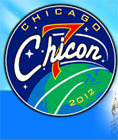 As I was contemplating my departure for Worldcon/Chicon in just a few days, I realized that I was eagerly anticipating the convention. And I wondered how I came to be THIS guy, looking forward to seeing old friends and acquaintances and meeting new ones, because when I drove off to my first convention I was confused about exactly what I was doing and why I was going, and more than a little nervous. All I knew is that I trusted the advice of my friend E.E. Knight. He ensured me that I really needed to start attending conventions, so I went.
As I was contemplating my departure for Worldcon/Chicon in just a few days, I realized that I was eagerly anticipating the convention. And I wondered how I came to be THIS guy, looking forward to seeing old friends and acquaintances and meeting new ones, because when I drove off to my first convention I was confused about exactly what I was doing and why I was going, and more than a little nervous. All I knew is that I trusted the advice of my friend E.E. Knight. He ensured me that I really needed to start attending conventions, so I went.
I didn’t used to know why someone would want to go to a writing/reading convention. I knew they existed, but I knew plenty of writers and readers and reasoned I didn’t need to go meet any others. After all, it was a long drive, and I’d be among strangers. (I used to be a lot more introverted until I got old enough to be comfortable in my own skin.)
Here’s the simplest answer — if you want to be a part of the industry, attending a few conventions every year is one of the best ways to become acquainted with it. If you’re already involved in the industry in some capacity, then attending a convention is a wonderful way to get to know other writers, editors, publishers, and journalists. Face time makes a lot more difference than you’d think. It’s possible, for instance, to find yourself at a late night party and suddenly realize you’re talking to an editor who sounds curious about your book. Ending up with a business card and a contact is much better than making a bunch of unsolicited submissions.
Will you feel overwhelmed? You might. Attend with friends the first few times, because you will be surrounded by people whom you don’t know, or whom you admire so much that you have trouble speaking with.
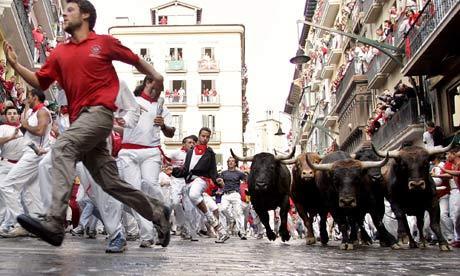
A Tor editor (in red) pursued by writers eager for novel contracts outside a Spanish convention.
It can take a while to get over that, which is why you shouldn’t wait until you’re out trying to promote your first book to start hob-nobbing at conventions. You should attend before so you feel more comfortable with conventions in general. So that you KNOW people. You can show up to their readings and they can show up to yours so that none of you are giving book readings to empty rooms.
If you’re wanting to talk with fellow fans and scholars about particular works or bodies of works, or learn some behind-the-scenes facts about the industry, or pick up some advice on writing and publishing, there are many fine convention panels. Quality varies from panel to panel, of course, but they’re so free-wheeling and interactive you’re bound to hear things that you might never have heard about the industry, and learn some anecdotes and pick up some wisdom that might not be cataloged anywhere else.
Why else should you attend? Well, writing is a solitary business. It can be a real pleasure to get out and talk with people who’re experiencing the same trials that you are. You can commiserate, offer advice, and share jokes and experiences that people who aren’t writers won’t get.
I just have one caveat — don’t press. Don’t be that gal who runs into the bathroom stall after her favorite editor and slides a manuscript under the stall. Don’t seek out all the important editors and pitch your book and ask for a card. Play the long game. The more conventions you attend, the more people you’ll know, and then introductions and connections become simpler. I wouldn’t say that they necessarily fall into your lap, but when they occur they’re far less pressured. And you will surely make a better impression if you’re more relaxed.
Some day you might even find yourselves looking forward to going and spending time among friends and colleagues.
August 27, 2012
A Guile of Dragons
Most of the weekend was spent working away on house-type stuff, although I did manage to revisit some favorite bits from The Arabian Nights. I wrote one of those stories up (“The Wily Dalilah”) over at Black Gate this morning, and I’ll likely be talking about more tales in the coming months.
Today, though, I thought I’d call attention to the work of my friend James Enge. Like me, he had a serial character appearing over at Black Gate before that character appeared in a series of novels from a major publisher. Well, James’ fourth novel of Morlock the Maker was released in early August, and if you like your fantasy mixed in with sly wit, clever word play, horror, and great action set pieces, then you’re late to the party.
This time James is writing Morlock’s origin story, so we’ll finally learn how Morlock came to be who he is. is set before the first three books, and is the first of a trilogy, although you shouldn’t dread the word. Like the first books these will standalone, although they will build upon one another.
Did I mention that Enge was nominated for a World Fantasy Award? I should have.
I once had a dream that my characters, Dabir and Asim, were standing near a swimming pool talking with Enge’s Morlock. I mentioned that to him and he said it wasn’t beyond the realms of possibility that the conversation could happen, as Morlock might be able to world hop.
Anyway — go buy the book.
August 23, 2012
Music to Muse By… and Other Questions
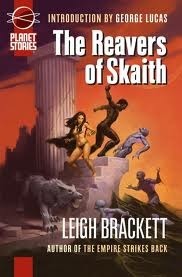 I thought I’d use today’s post to answer a few questions I’ve received.
I thought I’d use today’s post to answer a few questions I’ve received.
1. Why didn’t you like the third Skaith book by Leigh Brackett?
First, when I guest-starred over at the SF Signal Mind Meld yesterday, I made an off-hand comment about Leigh Brackett’s Skaith series not ending strongly. Some have written in to ask what I meant by that.
I thought that the final book of the three felt more like a contractual obligation. The second book ends with everything seemingly wrapped up and resolved. The third book finds us in the midst of an entirely new plot, with our main character still stranded on Skaith. It was… underdeveloped, a little rushed. Was it a decent story? Yes. Did I like it as well as the first two books? No. It felt tacked on to the plot I’d been reading through the first two books, which is why I didn’t list it as one of my series picks for best ending. But I still stand by my previous assessments that Leigh Brackett is one of the finest adventure writers we’ve ever had. She is one of my top three favorites… I just didn’t like this book as well.
2. What music do you listen to while you write?
Last week visitor Mick asked what music I listen to while writing, and the sad truth has to be admitted: none. I’m easily distracted while I’m writing. Anything at all can make it easier to notwrite. So, because I love cool computer games (especially ancient tactical games or civilization building games) I own none at all. If they were on my computer, I would play them. And because I started out college as a music major, and still find music theory fascinating, I find it very easy to start analyzing songs while they’re playing (sometimes to see why it’s so good, sometimes to critique it) and then I’m notwriting again.
So, no music while I’m writing of ancient Arabia. As to middle-eastern music I enjoy, there’s one CD I love to listen to while I drive around, but the danged thing turned up missing when I transferred my CDs to the wife’s car during my GenCon drive last week — so I can’t even provide the exact title!
3. What’s with the chickens?
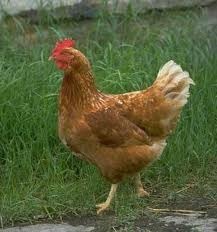 Some of you have noticed a photo floating around of me holding a rooster. (Probably because I posted it.) Well, the in-laws gifted us with about 2 dozen chicks one spring a few years ago. I wasn’t entirely happy with the gift, though my kids were delighted.
Some of you have noticed a photo floating around of me holding a rooster. (Probably because I posted it.) Well, the in-laws gifted us with about 2 dozen chicks one spring a few years ago. I wasn’t entirely happy with the gift, though my kids were delighted.
I was grumping and grumbly for days because I had to use my rather limited carpentry skills and tools (and for precise cuts, the aid of my friend Brad) to craft a hutch, perches, and other stuff. But it turns out that chickens are incredibly low maintenance, and fresh eggs are markedly better than store bought eggs. The only problem is that EVERYTHING seems to like chickens. Foxes. Raccoons. Dogs. We have to keep a careful watch on them or the poor things just disappear. Frequently, if you’re working in the barn near them and they think you’re going to attack, they just crouch low, which is probably quite convenient if you’re a fox looking for carryout chicken.
As for their disposition, they really are just as foolish as everyone says, although they can be wily when it comes to finding a way to get to food. You occasionally hear about how mean chickens and roosters can be, but because my kids handled the chicks a lot when they were little, none of the chickens chase us or object to being picked up — at least by us, even the roosters. The roosters were real scrappers, though. Both perished in a fight with something, probably a fox. Judging by all the fur we found by the carcasses, it must have been some battle.
August 22, 2012
Canals of Baghdad

A recent photo from Wilkinson showing the remnant of a Mesopotamian canal.
If you ever think about ancient Baghdad you’re likely to picture a sand-blasted landscape and a city growing alongside the river in a narrow band where the ground is rendered fertile by the water. A least, that’s how I used to imagine it, probably influenced by all the reading I’d done as a kid about ancient Egypt.
But 8th century Baghdad, while it surely was beside the river, didn’t rise up from a desert wasteland. At the time, the entire region was criss-cr0ssed by great canals. The Abbasid caliphate inherited a system that had been carefully managed by the Babylonians and the Persians and a whole slew of prior civilizations that had worked very hard to bring water to the land lying between the Tigris and the Euphrates rivers. That whole “fertile crescent” thing isn’t hyperbole.
Because the Euphrates is elevated several feet higher than the Tigris, the ancient peoples of Mesopotamia were able to set up an elaborate means to bring water to the land between the rivers — vast areas that are windblown and vacant today were once irrigated farmland. The canal remnant shown in the photo was destroyed some time in the 11th century. Imagine it a little deeper, then populate it with flat bottomed boats and other river craft plying their way from the Euphrates to the Tigris.
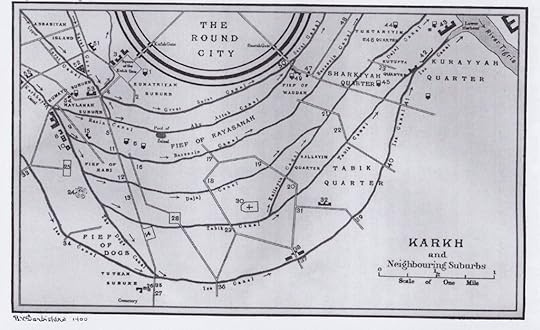
From Guy le Strange’s Baghdad During the Abbasid Caliphate.
Baghdad itself was criss-crossed with canals. The picture above is just the southern half of the city. At first glance it might seem like most of the lines are roads, but MOST are actually canals.
They were used for irrigation, drainage, and transportation. Some were small enough that you could step over them; some had to be traversed with stone bridges. In the early days of the Abbasid caliphate, there was an actual moat surrounding the central portion of the city (The Round City) where the majority of government offices and the original palace was constructed.
August 21, 2012
Chicon 7 Schedule
 If any of you are planning to attend the 70th World Science Fiction Convention in Chicago this year (aka Chicon 7), I hope you’ll drop by to hear me reading from the new novel on Friday, August 31st at 12:30 pm.
If any of you are planning to attend the 70th World Science Fiction Convention in Chicago this year (aka Chicon 7), I hope you’ll drop by to hear me reading from the new novel on Friday, August 31st at 12:30 pm.
The whole thing takes place in the Hyatt Regency in downtown Chicago. I’ll be reading from The Bones of the Old Ones in the DuSable room, which is located on the Silver level of the West Tower.
I’ll be participating on a panel as well, the subject of which is Writing What You Don’t Know. It takes place Saturday at 9:00 in the Gold level of the East Tower in Columbus rooms C and D.
There were a number of great sounding panels I wanted to sit down on, and this is one of them. Here’s the official description:
We remember English teachers lecturing: “Write what you know.” Well, we think you ought to write what you don’t know. How else can you write about space travel and alternate history and fire-breathing dragons and vampire detectives? We’ll discuss how a little research and common sense can give you just enough background to really write what you don’t know.
I loved the sound of this panel because I’ve actually spoken in public about the same topic. After all, I wasn’t born knowing anything about many of my favorite interests, like ancient Arabia, Hannibal of Carthage, the music of Badfinger, the original Star Trek, the historical fiction of Harold Lamb, what have you. If you’re not born in the time or culture or know the person, but you’re fascinated, then, by God, do some research!
Should be a good time. Fellow panelists include Jack Skillingstead, Louise Marley, Lynda Williams, and Rachel Neumeier
August 20, 2012
Back From GenCon
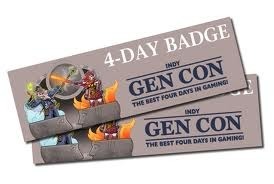 I returned from my whirlwind trip to GenCon late Saturday night. The four days of GenCon aren’t long enough to see and do everything, which means that the one day I was there didn’t give me a chance to really do the convention justice at all.
I returned from my whirlwind trip to GenCon late Saturday night. The four days of GenCon aren’t long enough to see and do everything, which means that the one day I was there didn’t give me a chance to really do the convention justice at all.
Still, I met (or re-connected with) a whole slew of interesting people.
Before I get into any recounting, I want to pass on my pleased impression about the GenCon staffers. There was some mild confusion about where my badge was supposed to be. When I arrived at the GenCon hall twenty minutes before I was scheduled to appear on a panel and my badge couldn’t be relocated, staff member Rik DesChain personally escorted me to the panel to make sure that I could get to where I needed to go, then marched off to sort out the matter with the missing badge.
It turns out that the Writers Symposium is the hidden gold at GenCon. I’ve been attending the convention for three years now, and I’d never heard of it. Yet the panels were well attended and packed with good friendly professionals ready with advice for all comers. I had a blast,and I think that the panels were informative and helpful. As the time draws close for GenCon registration next year I’ll be doing my best to help promote the symposium, because it honestly seems to be a great track for writers interested in learning about the industry and bettering their skills.
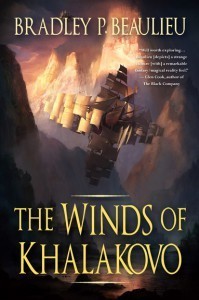 Over the course of two panels I got to know writers Elizabeth Vaughan, John Helfers, and Jason Sizemore (who also wears the editor/publisher hat). After the panels I finally got a chance to speak with author Brad Beaulieu, with whom I’ve been hoping to talk for the last two or three conventions I’ve attended. He introduced me to writer Paul Genesse, and then Brad and I bumped into author Mike Stackpole, who spoke with us at length about good kickstarter tactics.
Over the course of two panels I got to know writers Elizabeth Vaughan, John Helfers, and Jason Sizemore (who also wears the editor/publisher hat). After the panels I finally got a chance to speak with author Brad Beaulieu, with whom I’ve been hoping to talk for the last two or three conventions I’ve attended. He introduced me to writer Paul Genesse, and then Brad and I bumped into author Mike Stackpole, who spoke with us at length about good kickstarter tactics.
After that I spent much of the day at the Paizo booth. The Pathfinder crew are uniformly nice, as one always hopes to hear about talented, successful people. Amongst many excellent conversations were memorable ones with Paizo CEO Lisa Stevens, who shared some great anecdotes about her own gaming group, the affable Pierce Watters (who seems to know everyone, although he’s so level-headed and low-key you’d never guess it), my Pathfinder Tales editor and friend James Sutter (his Death’s Heretic was number 3 on the 2012 best fantasy list from B&N), and publisher Erik Mona, who shares my love for obscure pulps and authors. I spent the most time with my good friend, Pathfinder Tales author Dave Gross, signing books together and amusing each other with various stories of writerly mishaps and general geekery. At one point, while I was talking to a fan, he got me giggling with a witty aside from a third season original Star Trek episode. It is good to be among other Star Trek nerds sometimes.
Dave and I got to talk with some great folks, past and (hopefully) future readers. The Pathfinder Tales readers were a real joy to meet. It’s immensely gratifying to see someone’s eyes light up when they see that you’re the one who wrote the book they enjoyed.
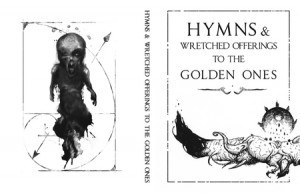 I wandered the floor in search of zocchi dice (for the DCC role-playing game) and some OSR game products I’ve grown increasingly curious about, but I couldn’t find them, although I did bump into Patrick Rothfuss, out taking in the sites himself, and babbled at him for a while about gaming and the Arabian Nights. I also popped in to meet critically acclaimed writer of pirate fiction (and future Pathfinder Tales author) Chris Jackson, who was selling books over on author’s row. I visited my artist friends Jim Pavalec and Chris Seaman (who had just won an impressive 2nd place in in one of the GenCon art competitions) and picked up a copy of Jim’s latest book.
I wandered the floor in search of zocchi dice (for the DCC role-playing game) and some OSR game products I’ve grown increasingly curious about, but I couldn’t find them, although I did bump into Patrick Rothfuss, out taking in the sites himself, and babbled at him for a while about gaming and the Arabian Nights. I also popped in to meet critically acclaimed writer of pirate fiction (and future Pathfinder Tales author) Chris Jackson, who was selling books over on author’s row. I visited my artist friends Jim Pavalec and Chris Seaman (who had just won an impressive 2nd place in in one of the GenCon art competitions) and picked up a copy of Jim’s latest book.
Dave and I grabbed dinner together, then I dropped by to talk with the talented Marc Tassin, Admiral of the GenCon Writer’s Symposium, and met a few more writer folks from the panels… although at that point I was fading fast, so I’m not entirely sure I was coherent. Before an hour was up I had to beg off to catch the last zeppelin flight home before it got too much later.
In short, GenCon is a good place to be, and an even better place to be for writers than I knew of. Next year I’ll be staying for the duration rather than dropping in for a single day. I hope to see you there!
Howard Andrew Jones's Blog
- Howard Andrew Jones's profile
- 368 followers



